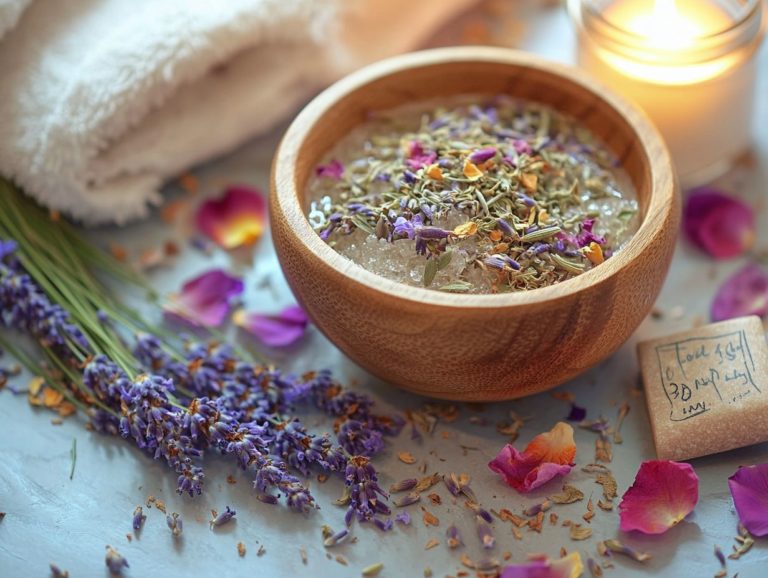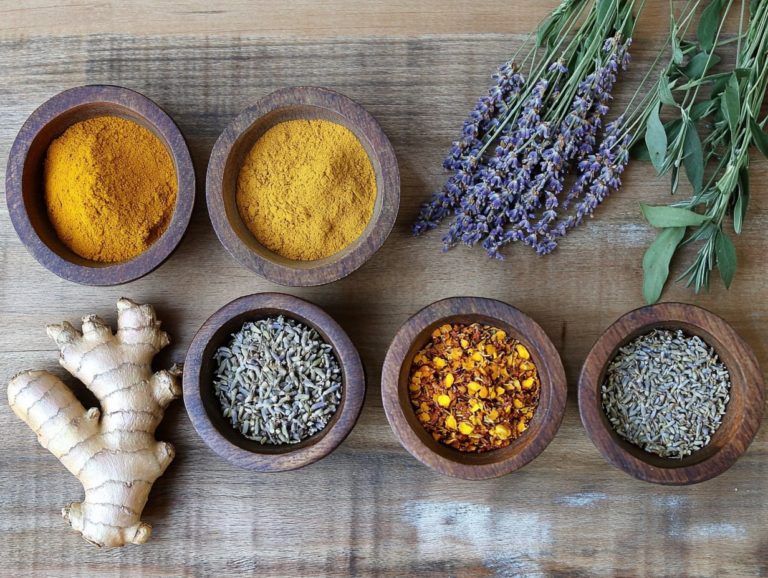Herbs for Better Sleep: A Guide
Quality sleep is essential for your well-being. Yet, many find it elusive. Poor sleep can severely impact your physical and mental health, leading to fatigue and irritability.
This guide explores amazing herbs that can boost your sleep. It offers effective methods to seamlessly incorporate them into your nightly routine. It also highlights potential side effects and interactions to be aware of, while providing practical tips to elevate your sleep hygiene.
Don’t wait discover how the right herbs can transform your rest and rejuvenate your life!
Contents
- Key Takeaways:
- The Importance of Quality Sleep
- Common Herbs for Better Sleep
- How to Incorporate Herbs into Your Sleep Routine
- Potential Side Effects and Interactions
- Tips for Better Sleep
- Frequently Asked Questions
- What are the top herbs used for better sleep?
- How do these herbs help improve sleep?
- Can I take these herbs in supplement form?
- Are there any potential side effects of using these herbs?
- Is it safe to use these herbs with prescription sleep medication?
- Can I use these herbs for my children who have trouble sleeping?
Key Takeaways:
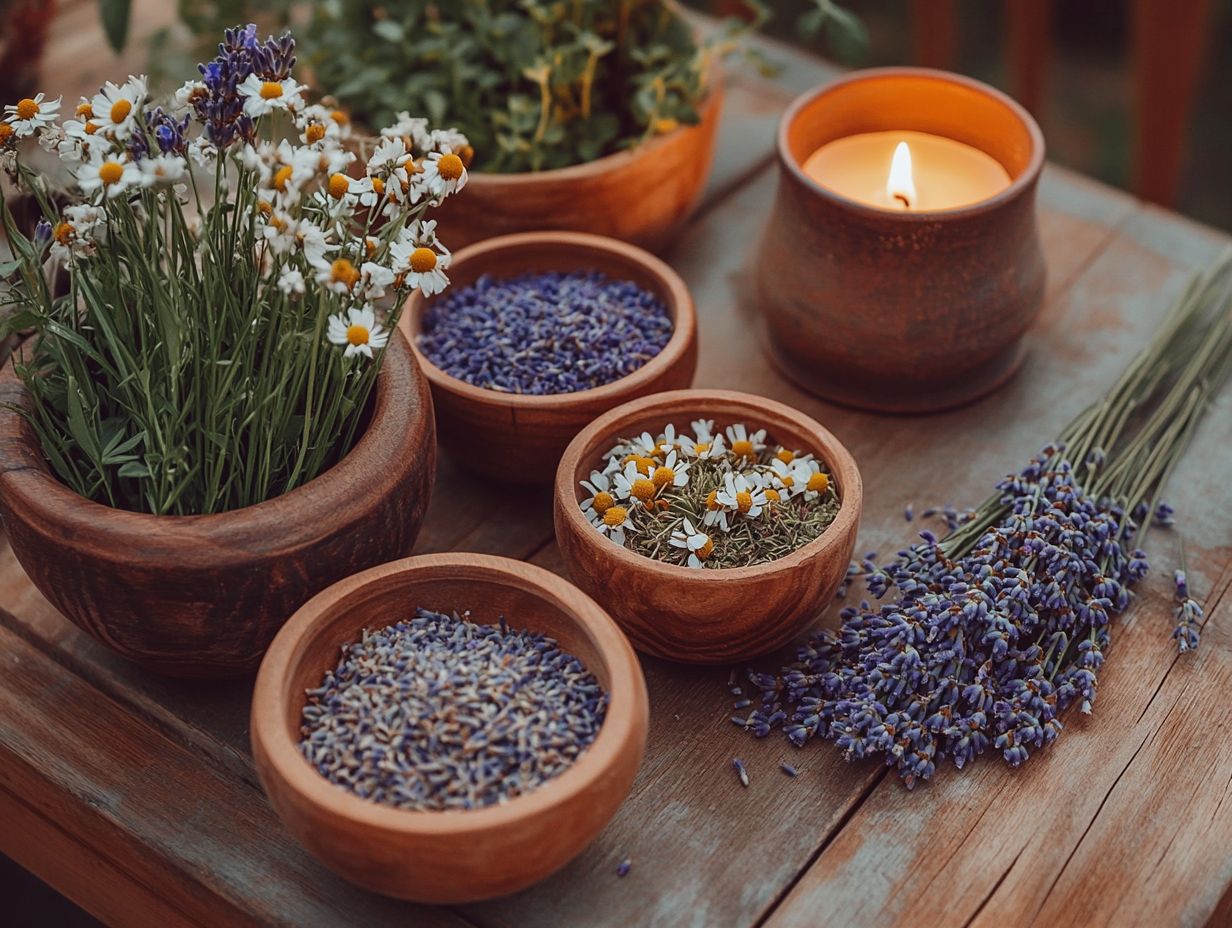
- Adequate sleep is crucial for overall health and well-being. Poor sleep can have negative effects on physical and mental health.
- Incorporating common herbs such as lavender, chamomile, and valerian into your sleep routine can promote better sleep.
- Herbs for better sleep can be consumed in various forms, such as teas, essential oils, and supplements. It is important to be aware of potential side effects and interactions before use.
The Importance of Quality Sleep
Quality sleep is not just a luxury; it s essential for your overall health, particularly your respiratory health, cognitive function, and emotional well-being. When you skimp on sleep, you open the door to a host of health issues, including insomnia something that plagues countless individuals. That s why it s crucial to prioritize those restful nights.
While sleeping pills and conventional medicine may seem like go-to solutions, they often come with their own set of downsides and side effects that can worsen the situation for those already feeling drained. Try a holistic approach instead. By incorporating dietary supplements and natural remedies, you can significantly enhance your sleep quality and alleviate challenges that come with sleepless nights.
Effects of Poor Sleep on Health
Poor sleep can have a profound impact on your health. It can worsen respiratory issues and heighten the risk of anxiety and depression.
When you skimp on rest, you might find yourself battling daytime drowsiness. This can hinder your ability to focus and tackle daily tasks efficiently. Chronic sleep deprivation can spiral into insomnia, leading some to seek out sleep medications. However, it’s important to note that these medications can come with their own set of drawbacks, including dependency and unwanted side effects.
The connection between inadequate sleep and physical health is significant. A lack of restorative sleep can compromise your immune system, leaving you more vulnerable to illnesses. Therefore, grasping the intricate implications of poor sleep is vital for your overall well-being.
Common Herbs for Better Sleep
Common herbs that can enhance your sleep encompass a variety of soothing plants, each traditionally revered for their ability to improve sleep quality and encourage deeper, more restorative slumber.
Overview of Popular Herbs
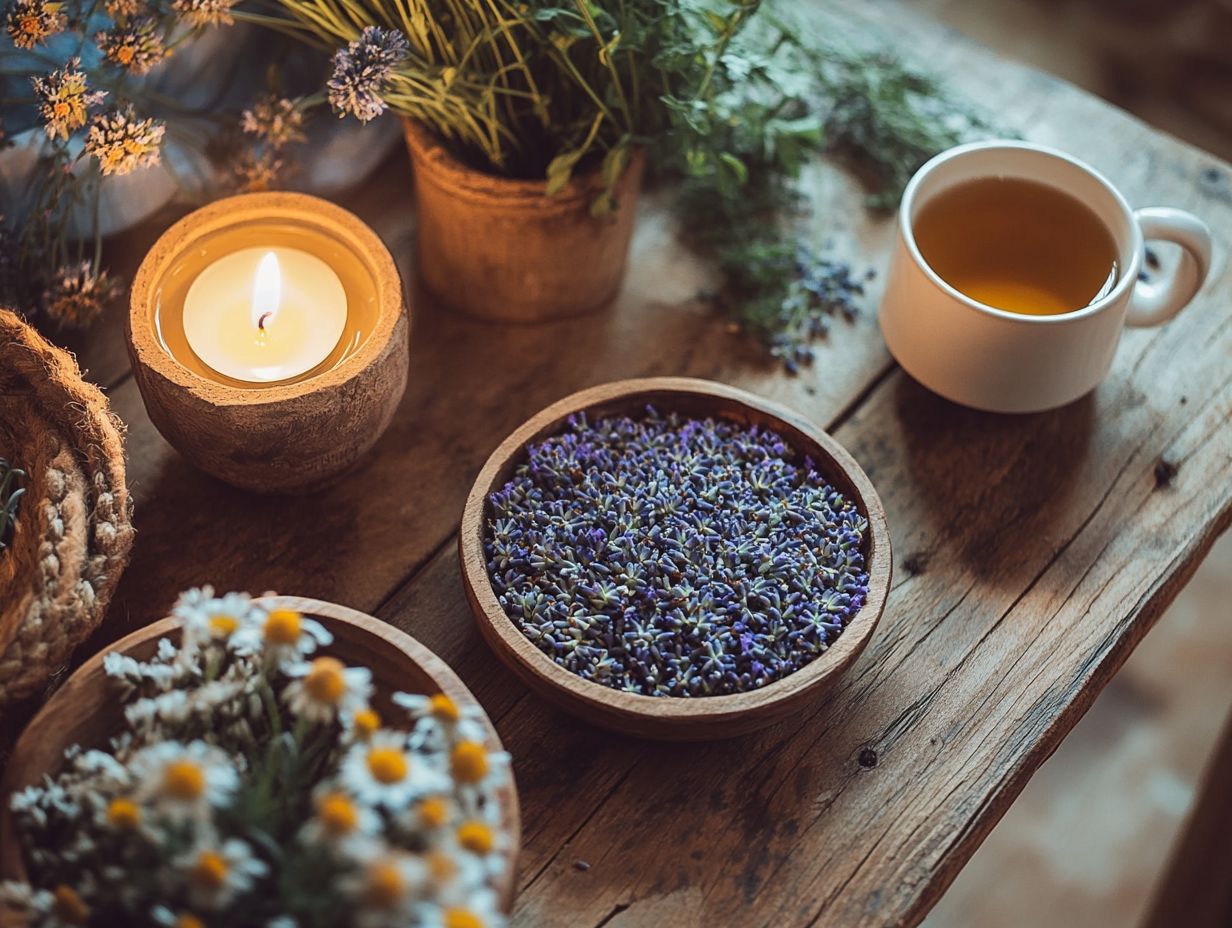
Several popular herbs have gained recognition for their remarkable ability to promote natural sleep, each offering unique benefits that cater to your needs.
These herbal remedies, often sought after for their calming properties, can play a pivotal role in enhancing your overall well-being. Take valerian root, for instance; it s celebrated for its sedative effects, helping you fall asleep faster while improving the quality of your slumber.
Then there’s chamomile, with its gentle, soothing aroma often brewed as a tea which is known for reducing anxiety and promoting relaxation.
Lavender is another favorite, frequently used in essential oils and aromatherapy; its serene fragrance can help lower your heart rate and reduce stress levels. And let s not overlook passionflower, which is recognized for alleviating insomnia by boosting gamma-aminobutyric acid (GABA), a neurotransmitter that helps calm the brain, creating a tranquil environment perfect for restful sleep.
How to Incorporate Herbs into Your Sleep Routine
Incorporating herbs into your sleep routine offers a sophisticated yet straightforward approach to enhancing your overall sleep quality. You can explore a variety of consumption methods that seamlessly align with your lifestyle, making it an enjoyable addition to your nightly rituals.
Start your journey to better sleep tonight!
Methods of Consumption
You have several methods for consuming herbal remedies that can enhance your sleep. Options like herbal tea, tinctures, and glycerin extracts each offer distinct benefits tailored to your preferences and needs.
For instance, herbal tea provides a soothing ritual. Steeping calming ingredients like chamomile or valerian root creates a warm, relaxing brew that wraps you in comfort.
On the other hand, tinctures deliver strong plant liquids that make dosing easy and allow for quick absorption. Just a few drops under your tongue can effectively prepare your body for rest.
If you prefer something gentler, glycerin extracts, made with glycerin instead of alcohol, offer a sweet alternative perfect for those sensitive to stronger tinctures. They make a great addition to your evening routine.
By exploring these various options, you can find the best way for you to sleep better!
Potential Side Effects and Interactions
While herbal remedies can offer relief for sleep issues, it’s essential to consider potential side effects and interactions with conventional medications. This careful consideration is key to ensuring both safety and effectiveness in your approach to better sleep.
Precautions and Warnings
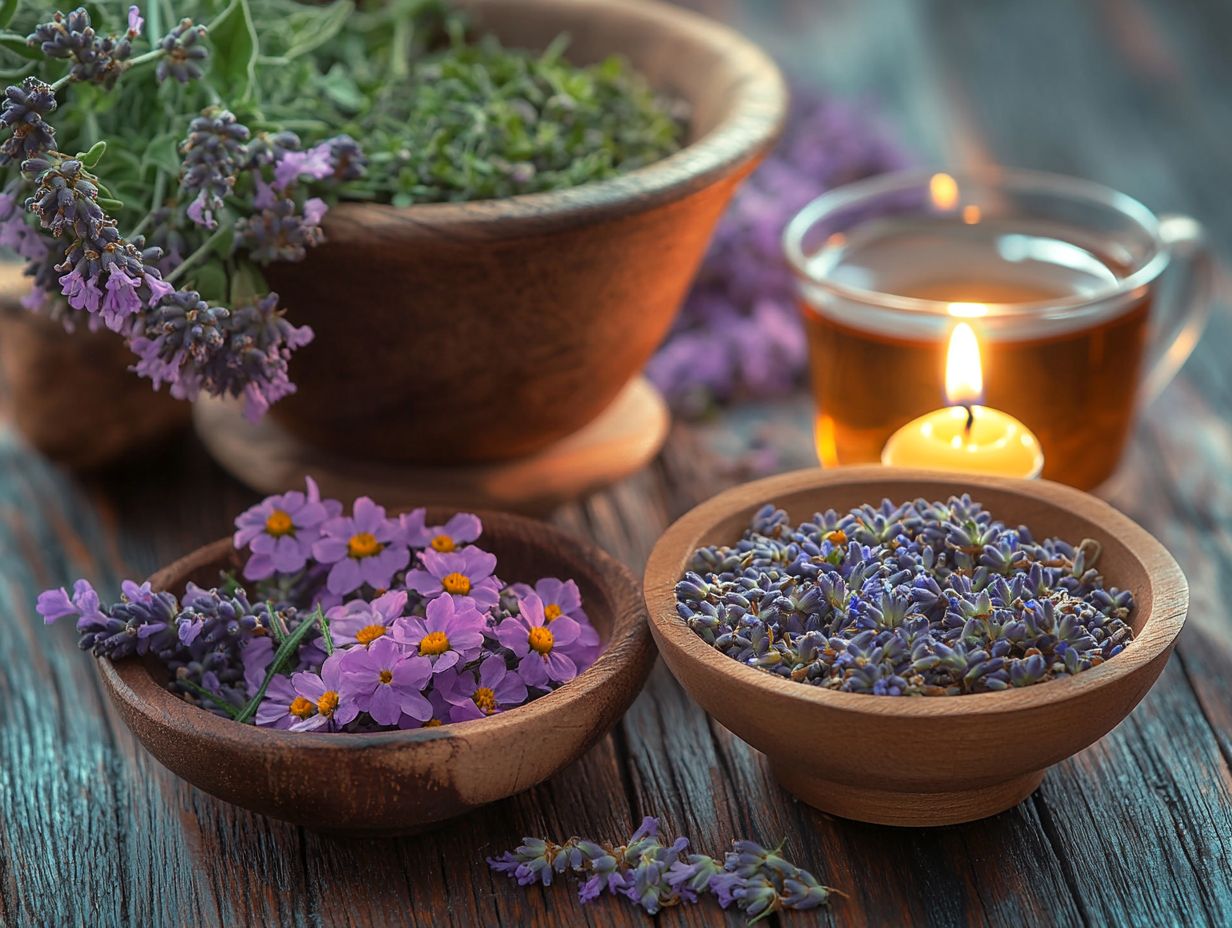
When turning to herbs for sleep, it s crucial to tread carefully and stay informed about potential warnings to avoid unwanted side effects. These precautions are particularly important due to the numerous interactions that herbal supplements can have with both over-the-counter and prescription medications.
Take valerian root, for example a popular choice for insomnia. While it can be effective, it may amplify the effects of sedatives, leading to excessive drowsiness. Similarly, willow bark can interact with blood thinners, increasing the risk of bleeding.
Consulting with healthcare professionals before introducing new herbal products into your routine is a wise move, especially if you have underlying health conditions or are currently taking other medications. This careful approach ensures you can safely enjoy the benefits of these natural remedies without compromising your well-being.
Tips for Better Sleep
Achieving better sleep requires a holistic approach involving lifestyle changes and thoughtfully incorporating dietary supplements. These elements work together to enhance melatonin production, the hormone that helps you sleep, and support your quest for restorative slumber.
Incorporating Other Lifestyle Changes
Making other lifestyle changes, such as stress management techniques and dietary adjustments, can significantly improve your ability to achieve sufficient sleep and reduce inflammation.
By focusing on a balanced diet rich in whole foods think leafy greens and omega-3 fatty acids you can support your body s natural healing processes. Regular physical activity, like yoga or brisk walking, not only keeps you fit but also releases delightful endorphins that lift your mood and promote relaxation.
Practicing mindfulness or meditation helps you relax, allowing you to cultivate a calmer mindset that encourages better sleep patterns. When you implement these holistic approaches alongside herbal remedies, you create a powerful synergy that ultimately leads to improved overall well-being and a truly restorative night’s rest.
Frequently Asked Questions
What are the top herbs used for better sleep?
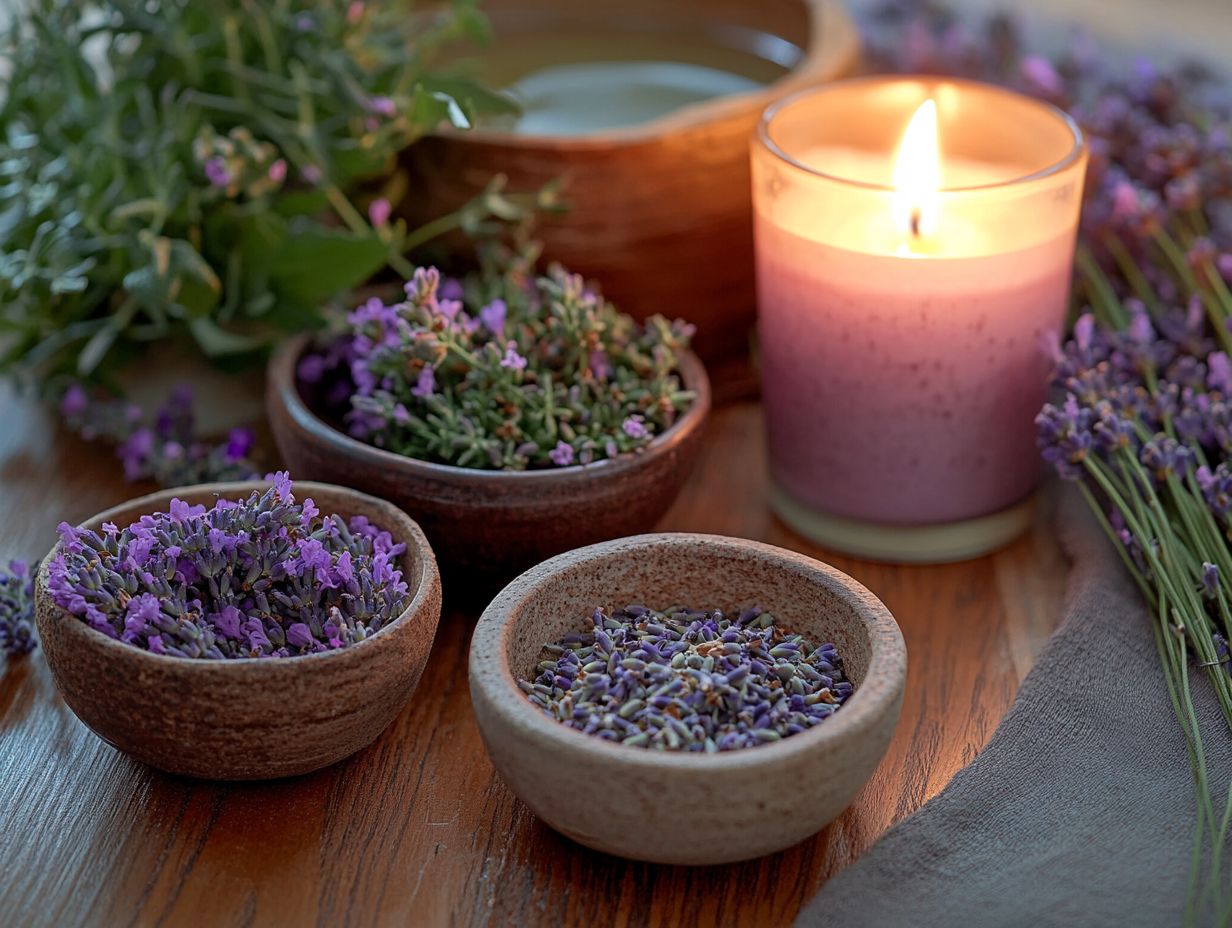
Some of the top herbs for better sleep include valerian root, chamomile, lavender, passionflower, lemon balm, and ashwagandha.
How do these herbs help improve sleep?
These herbs help you relax, reducing stress and anxiety, and calming the mind and body, making it easier to fall asleep and stay asleep.
Can I take these herbs in supplement form?
Yes! These herbs are widely available in supplement form, including capsules, tablets, teas, and tinctures. Be sure to follow the recommended dosage on the product label.
Start your journey to a peaceful night’s sleep today!
Are there any potential side effects of using these herbs?
Herbs are generally safe. However, some people may experience side effects like drowsiness, headaches, or an upset stomach. Always consult with a healthcare professional before trying new herbs!
Is it safe to use these herbs with prescription sleep medication?
Always talk to your healthcare provider before mixing these herbs with prescription sleep medications. They may interact and lead to unexpected side effects!
Can I use these herbs for my children who have trouble sleeping?
Some herbs, like chamomile and lemon balm, are safe for children in the right doses. Check with your pediatrician before giving any herbal sleep aids to your child!


